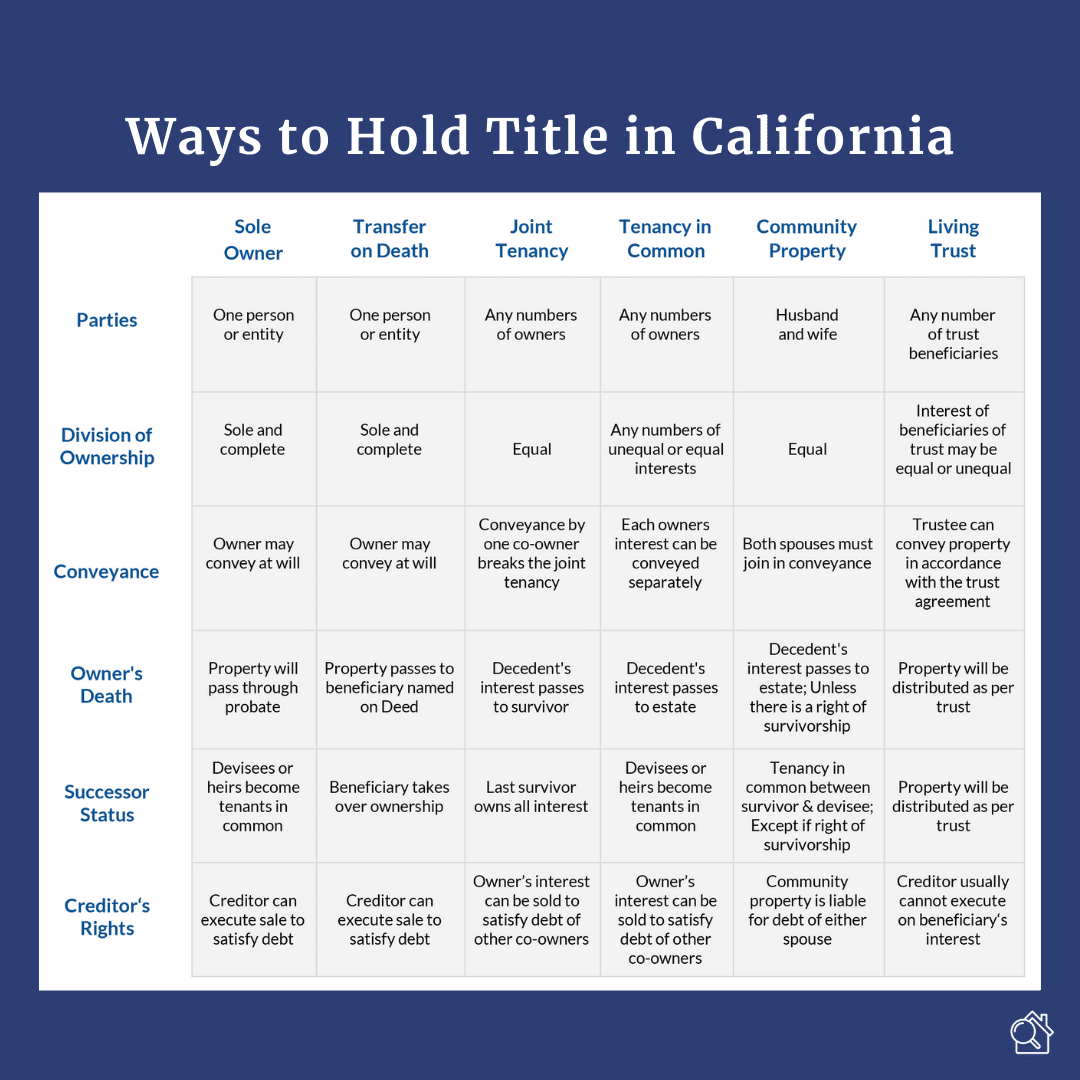
One of the important considerations, and unfortunately, least thought of things when buying a home is the way you hold title to your property. It will determine how your ownership will be structured, how it will be sold, taxed, etc. Ideally, it’s best to talk to a real estate lawyer before deciding but to give you a gist, here in the state of California, there are 6 ways to hold title. But before diving into it, it’s helpful to know the following terms:
Legal Terms to Know:
Title: A document that shows legal ownership to a property.
Conveyance: Refers to the act of transferring property from one party to another.
Deed: A signed legal document that grants its holder specific rights to an asset—provided that he or she meets a number of conditions.
Right of survivorship: A surviving member/s will inherit the total value of the other member’s share of property upon the death of that other member.
Probate: A legal process in which a will is reviewed to determine whether it is valid and authentic. Probate also refers to the general administering of a deceased person’s will or the estate of a deceased person without a will.
Trust: A fiduciary relationship in which one party, known as a trustor, gives another party, the trustee, the right to hold title to property or assets for the benefit of a third party, the beneficiary. Trusts are established to provide legal protection for the trustor’s assets, to make sure those assets are distributed according to the wishes of the trustor, and to save time, reduce paperwork and, in some cases, avoid or reduce inheritance or estate taxes.
Different Ways to Hold Title:
- Sole Ownership
This option is best for those who are:
a) a single individual
b) an individual or a business in real estate investing
c) a married person who wants to have sole control of a property without their spouse (the spouse is usually asked to sign a quitclaim deed giving up any ownership interest in the property.)
Sole ownership allows for an easy transfer of property because apart from the owner’s, no additional consent is required. In the event of death, the property will be transferred according to the last will or will be probated through the court.
- Transfer on Death
The transfer on death designation is an alternative to sole ownership that allows a property owned by a single person to be passed directly to a beneficiary upon the owner’s death. The named beneficiaries have no access to or control over a person’s assets as long as the person is alive.
- Joint Tenancy
This arrangement allows two or more people to own a property together, each with equal rights and obligations. Joint tenancies can be created by married and non-married couples, friends, relatives, and business associates. This legal relationship creates what is known as a right of survivorship so if one owner dies, their interest in the property is directly passed on to the surviving party(s) without having to go through the probate or court system. Financial burdens and other legal responsibilities are shared by the owners.
If an owner chooses to sell or transfer his/her interest while still alive, which he or she is free to do, it will then be replaced with a Tenancy in Common.
- Tenancy in Common
Tenancy in common is an arrangement where two or more people share ownership rights in a property or parcel of land. The property may be commercial or residential. When a tenant in common dies, the property passes to that tenant’s estate. Each independent owner may control an equal or different percentage of the total property (for example, Sam owns 25%, Dean owns 75%). Also, the tenancy in common partner has the right to leave their share of the property to any beneficiary as a portion of their estate. The disadvantage is that, without right of survivorship, each co-owners interest will be subject to probate.
- Community Property
This option is best for those who are a married couple or domestic partnership. Each spouse is provided equal ownership to the property. Both spouses must consent in the event of a transfer of property. They can will the property separately, so say one of the spouses dies, that spouse’s share of interest will pass through the probate process. They can also hold the title as Community Property with Right of Survivorship where the property would not go through probate anymore, but to be assumed completely by the surviving spouse.

Living Trust
Probably the best way to hold title. The problem with a will is that it becomes a part of public probate file while a living trust remains private. When the owner dies, the property is then transferred, outside of probate, to a trustee who manages the estate according to the deceased owners wishes rather than the court managing the estate. It comes with a price though (around under $1000) but probate costs and delays can be avoided.
If you have any questions about purchasing real estate, please don’t hesitate to contact the team at Broadpoint Properties. And… when considering how to select title, remember that if you aren’t sure, it is always best to consult with an attorney before completing your purchase.
Source: Investopedia



